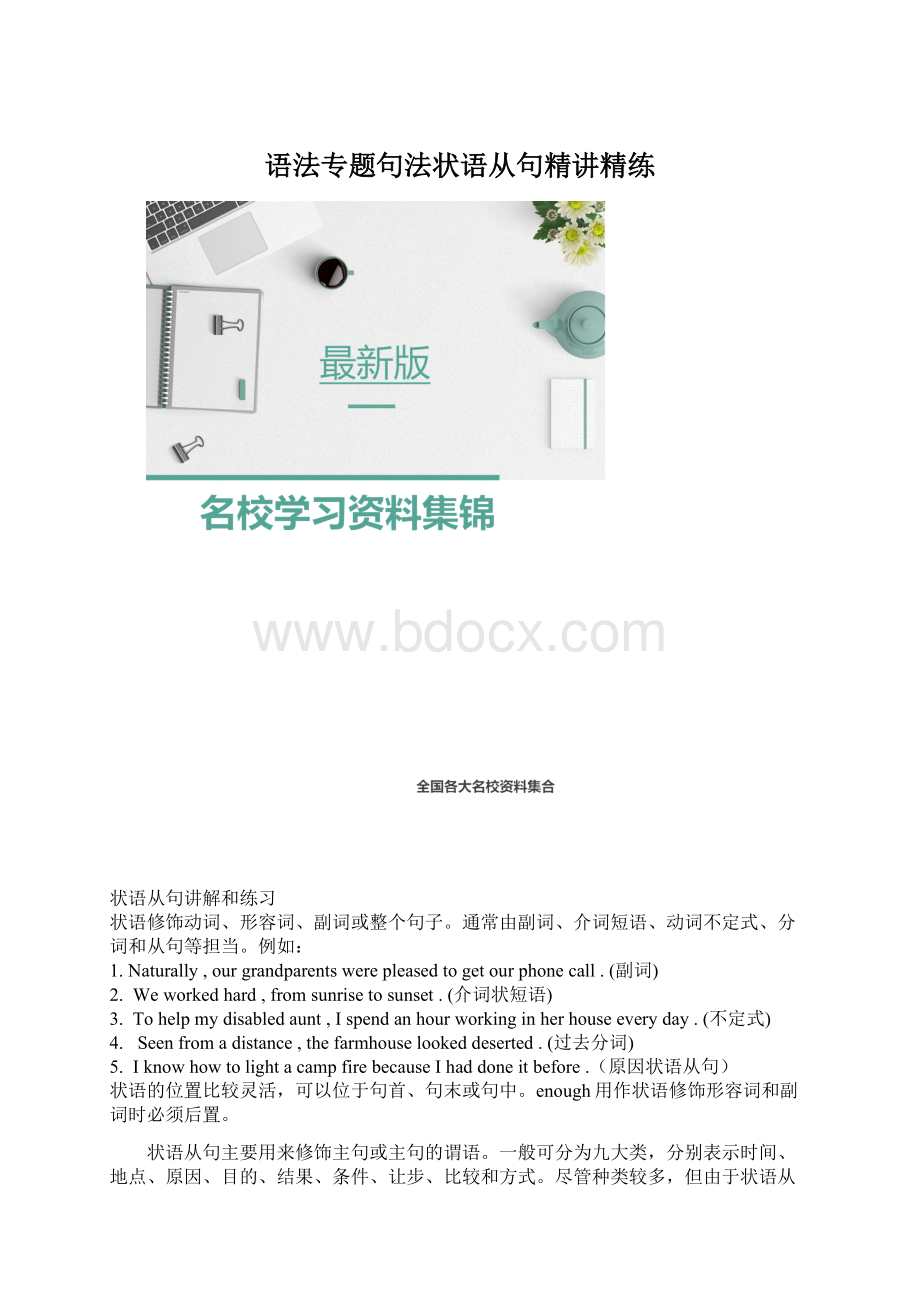语法专题句法状语从句精讲精练.docx
《语法专题句法状语从句精讲精练.docx》由会员分享,可在线阅读,更多相关《语法专题句法状语从句精讲精练.docx(12页珍藏版)》请在冰豆网上搜索。

语法专题句法状语从句精讲精练
状语从句讲解和练习
状语修饰动词、形容词、副词或整个句子。
通常由副词、介词短语、动词不定式、分词和从句等担当。
例如:
1. Naturally,ourgrandparentswerepleasedtogetourphonecall.(副词)
2. Weworkedhard,fromsunrisetosunset.(介词状短语)
3. Tohelpmydisabledaunt,Ispendanhourworkinginherhouseeveryday.(不定式)
4. Seenfromadistance,thefarmhouselookeddeserted.(过去分词)
5. IknowhowtolightacampfirebecauseIhaddoneitbefore.(原因状语从句)
状语的位置比较灵活,可以位于句首、句末或句中。
enough用作状语修饰形容词和副词时必须后置。
状语从句主要用来修饰主句或主句的谓语。
一般可分为九大类,分别表示时间、地点、原因、目的、结果、条件、让步、比较和方式。
尽管种类较多,但由于状语从句与汉语结构和用法相似,所以理解和掌握它并不难。
状语从句的关键是要掌握引导不同状语从句的常用连接词
和特殊的连接词即考点。
现分别列举如下:
1.时间状语从句
常用引导词:
when,as,while,assoonas,while,before,after,since,till,until
特殊引导词:
theminute,themoment,thesecond,everytime,theday,theinstant,immediately,directly,nosooner…than,hardly…when,scarcely…when
Ididn’trealizehowspecialmymotherwasuntilIbecameanadult.
WhileJohnwaswatchingTV,hiswifewascooking.
Thechildrenranawayfromtheorchard(果园)themomenttheysawtheguard.
NosoonerhadIarrivedhomethanitbegantorain.
EverytimeIlistentoyouradvice,Igetintotrouble.
2.地点状语从句
常用引导词:
where
特殊引导词:
wherever,anywhere,everywhere
Generally,airwillbeheavilypollutedwheretherearefactories.
Whereveryougo,youshouldworkhard.
3.原因状语从句
常用引导词:
because,since,as,since
特殊引导词:
seeingthat,nowthat,inthat,consideringthat,giventhat,consideringthat,
MyfriendsdislikemebecauseI’mhandsomeandsuccessful.
Nowthateverybodyhascome,let’sbeginourconference.
Thehigherincometaxisharmfulinthatitmaydiscouragepeoplefromtryingtoearnmore.
Consideringthatheisnomorethan12yearsold,hisheightof1.80misquiteremarkable.
4.目的状语从句
常用引导词:
sothat,inorderthat
特殊引导词:
lest,incase,forfearthat,inthehopethat,forthepurposethat,totheendthat
Thebossaskedthesecretarytohurryupwiththeletterssothathecouldsignthem.
Theteacherraisedhisvoiceonpurposethatthestudentsinthebackcouldhearmoreclearly.
5.结果状语从句
常用引导词:
so…that,so…that,such…that,
特殊引导词:
suchthat,tothedegreethat,totheextentthat,tosuchadegreethat,
Hegotupsoearlythathecaughtthefirstbus.
It’ssuchagoodchancethatwemustnotmissit.
Tosuchandegreewasheexcitedthathecouldn’tsleeplastnight.
6.条件状语从句
常用引导词:
if,unless,
特殊引导词:
as/solongas,onlyif,providing/providedthat,supposethat,incasethat,onconditionthat
We’llstartourprojectifthepresidentagrees.
Youwillcertainlysucceedsolongasyoukeepontrying.
Providedthatthereisnoopposition,weshallholdthemeetinghere.
7.让步状语从句
常用引导词:
though,although,evenif,eventhough
特殊引导词:
as(用在让步状语从句中必须要倒装),while(一般用在句首),nomatter…,inspiteofthefactthat,while,whatever,whoever,wherever,whenever,however,whichever
MuchasIrespecthim,Ican’tagreetohisproposal.
尽管我很尊敬他,我却不同意他的建议。
Theoldmanalwaysenjoysswimmingeventhoughtheweatherisrough.
Nomatterhowhardhetried,shecouldnotchangehermind.
Hewon’tlistenwhateveryoumaysay.
8.比较状语从句
常用引导词:
as(同级比较),than(不同程度的比较)
特殊引导词:
themore…themore…;justas…,so…;AistoBwhat/asXistoY;no…morethan;notAsomuchasB
Sheisasbad-temperedashermother.
Thehouseisthreetimesasbigasours.
Themoreyouexercise,thehealthieryouwillbe.
Foodistomenwhatoilistomachine.食物之于人,犹如油之于机器。
9.方式状语从句
常用引导词:
as,asif,how
特殊引导词:
theway
WheninRome,doastheRomando.
Shebehavedasifsheweretheboss.
Sometimesweteachourchildrenthewayourparentshavetaughtus.
10. 状语从句的简化
♠状语从句的省略
状语从句同时具备下列两个条件:
①主句和从句的主语一致,或从句主语为it;②从句主要动词是be的某种形式。
从句中的主语和be动词常可省略。
例如:
When(themuseumis)completed,themuseumwillbeopentothepublicnextyear.
He’llgototheseasideforhisholidayif(itis)possible.
另外,比较状语从句经常省略。
例如:
I’mtallerthanhe(istall).
Thehigherthetemperature(is),thegreaterthepressure(is).
就状语从句而言,有时为了使语言言简意赅,常常将状语从句进行"简化"。
状语从句的"简化"现象在口语中较为普遍,而且在高考中的复现率也较高。
因此,有必要对其进行全面、透彻的了解。
状语从句的"简化"现象常存在于以下五种状语从句中:
①由if,unless等引导的条件状语从句;②由although,though,evenif/though等引导的让步状语从句;③由when,while,as,before,after,until/till等引导的时间状语从句;④由as,asif等引导的方式状语从句;⑤由as,than等引导的比较状语从句。
下面针对这五种情形作一归纳。
(1)当状语从句的主语是it,且谓语动词是be时,it和be要完全简化掉。
例如:
If(itis)possible,hewillhelpyououtofthedifficulty.如果可能的话,他会帮你摆脱困境。
Youmustattendthemeetingunless(itis)inconvenienttoyou.除非情况对你来说不方便,否则你必须出席这次会议。
(2)当状语从句的主语和主句的主语一致时,从句可以将主语和be动词简化掉。
常用于以下几种情形:
a.连词+形容词
As(hewas)young,helearnedhowtorideabike.他小时候就学会了骑自行车。
Whenever(sheis)free,sheoftengoesshopping.她有空就去逛商店。
Workhardwhen(youare)young,oryou'llregret.少壮不努力,老大徒伤悲。
b.连词+名词
While(hewas)ayoungboy,hewasalwaysreadytohelpothers.他在孩提时代就乐于助人。
Although(hewas)afarmer,nowheisafamousdirector.尽管他曾是个农民,而现在是位著名的导演了。
c.连词+现在分词
As(shewas)walkingalongtheriverbank,shewassingingapopsong.她沿着河堤边走边唱着流行歌曲。
Although(heis)doinghisbestinmathsthesedays,hehasstillgotnogoodmarks.尽管近来他一直在学数学,但他仍然没有取得好成绩。
d.连词+过去分词
Hewon'tgotherewithusunless(heis)invited.除非受到邀请,否则他不会和我们一道去那里。
Theconcertwasagreatsuccessthan(itwas)expected.这场音乐会出乎意料地取得了巨大成功。
e.连词+不定式
Hestoodupasif(hewere)tosaysomething.当时他站起来好像要说什么。
Hewouldn'tsolvetheproblemevenif(hewere)totakecharge.即使他来负责,他也解决不了这个问题。
f.连词+介词短语
Shelookedanxiousasthough(shewas)introuble.她看上去很焦急,好像遇到了麻烦。
HehadmasteredtheEnglishlanguagebefore(hewas)intheUSA.他到美国之前就懂英语了。
注意:
当从句主语和主句主语不一致时,从句部分要么用完全形式,要么用独立主格结构来表达。
例如:
Whenthemeetingwasover,allthepeoplewentoutofthemeeting-room.当会议结束时,人们都走出了会议室。
(=Themeetingover,
巩固练习
1.Johnshuteverybodyoutofthekitchen______hecouldpreparehisgrandsurprisefortheparty.
A.which B.when C.sothat D.asif
2.Iwouldappreciateit________youcallbackthisafternoonforthedoctor’sappointment.
A.until B.if C.when D.that
3.AsfarasIamconcerned,educationisaboutlearningandthemoreyoulearn,________.
A.themoreforlifeareyouequipped B.themoreequippedforlifeyouare
C.themorelifeyouareequippedfor D.youareequippedthemoreforlife
4.Afterthewar,anewschoolbuildingwasputup________therehadoncebeenatheatre.
A.that B.where C.which D.when
5.—IsMr.Smithintheoffice?
—Yes,________heisinchargeoftheoffice,hemustbethere.
A.since B.however C.whether D.for
6.Asyourgoodfriend,Iwilldo________helpyou.
A.thatIcanto B.whatIcanto C.allthatIcan D.whatIcan
7.Johnmayphonetonight.Idon’twanttogoout________hephones.
A.aslongas B.inorderto C.incase D.sothat
8.Someonecalledmeupinthemiddleofthenight,buttheyhungup________Icouldanswerthephone.
A.as B.since C.until D.before
9.—Don’tlookdownuponBob.Hehashisownadvantages.
—Oh,yes.________othersareweak,heisstrong.
A.If B.When C.Where D.Though
10.Itistenyears________hesmoked.
A.that B.when C.since D.while
11.Wemusthurryup________catchupwiththelasttrain.
A.that B.sothatto C.inorderthat D.inorderto
12.Nomatter________harditmaybe,Iwillcarryitout.
A.what B.whatever C.how D.however
13.________youmaydo,youmustdoitwell.
A.Which B.Whenever C.Whatever D.When
14.—AreyouthinkingaboutgoingtoNewYorkfortheholiday?
—No.ButifI________thetime,Iwoulddefinitelygo.
A.have B.had C.havehad D.wouldhave
15.________youaresoweak,you’dbetterstayathome.
A.Since B.For C.Because D.Though
16.EnglishandFrencharetaughthere.Youcanchoose________youlike.
A.nomatterwhich B.whichever C.which D.whatever
17.IsawMr.SmithlastSunday.Wehadnotseeneachother________IleftLondon.
A.as B.before C.since D.till
18.I’llbebackbeforeyou________.
A.willleave B.willhaveleft C.leave D.wouldleave
19.Theproblemwon’tbesettleduntilwe________achancetodiscussitthoroughly.
A.havehad B.willhave C.willhavehad D.wouldhave
20.Ifyou________thisexperiment,youwillunderstandthetheorybetter.
A.willbedoing B.havedone C.willhavedone D.woulddo
21.Theywentonworking________itwaslateatnight.
A.evenif B.asif C.however D.asthough
22.Ihurried________Iwouldn’tbelateforclass.
A.since B.sothat C.asif D.unless
23.Thevolleyballmatchwillbeputoffifit________.
A.willrain B.rains C.rained D.israining
24.________youtalktosomeoneorwriteamessage,youshowyourskillstoothers.
A.Attimes B.Sometime C.Bythetime D.Everytime
25.Althoughheisconsideredagreatwriter,________.
A.howeverhisworksarenotwidelyread B.buthisworksarenotwidelyread
C.hisworksarenotwidelyread D.still